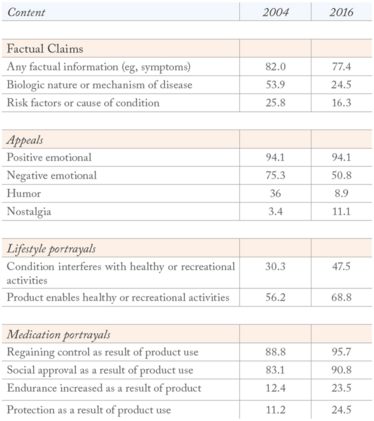Style Over Substance
Pharma TV ads are getting longer, less humorous and more nostalgic – while containing fewer facts
In 2005, the Pharmaceutical Researchers and Manufactures of America (PhRMA) issued its set of principles on how pharma companies should advertise their products to consumers on TV. They stated that information about drug benefits and risks should be accurate, clear, balanced, and evidence-based in compliance with regulations. In addition, ads should responsibly educate consumer about the medicine and the condition, promote health and disease awareness, and inform the audience about other options, such as diet and other lifestyle changes, where appropriate (1). Are pharma companies today meeting those expectations? And how has pharma advertising changed over the past 13 years?
Janelle Applequist and Jennifer Gerard Ball, researchers from the Zimmerman School of Advertising and Mass Communications at the University of South Florida, compared direct-to-consumer pharma ads from 2004 to those broadcasted in 2016. They found that, on the whole, adverts in 2016 were longer, contained less factual information about the drug and focused more on lifestyle improvements made post medication (1). Here, we present some of the main findings.

- J Applequist and JG Ball, “An updated analysis of direct-to-consumer television advertisements for prescription drugs”, Ann Fam Med, 16, 211-216 (2018). PMID: 29760024.

Over the course of my Biomedical Sciences degree it dawned on me that my goal of becoming a scientist didn’t quite mesh with my lack of affinity for lab work. Thinking on my decision to pursue biology rather than English at age 15 – despite an aptitude for the latter – I realized that science writing was a way to combine what I loved with what I was good at.
From there I set out to gather as much freelancing experience as I could, spending 2 years developing scientific content for International Innovation, before completing an MSc in Science Communication. After gaining invaluable experience in supporting the communications efforts of CERN and IN-PART, I joined Texere – where I am focused on producing consistently engaging, cutting-edge and innovative content for our specialist audiences around the world.



















